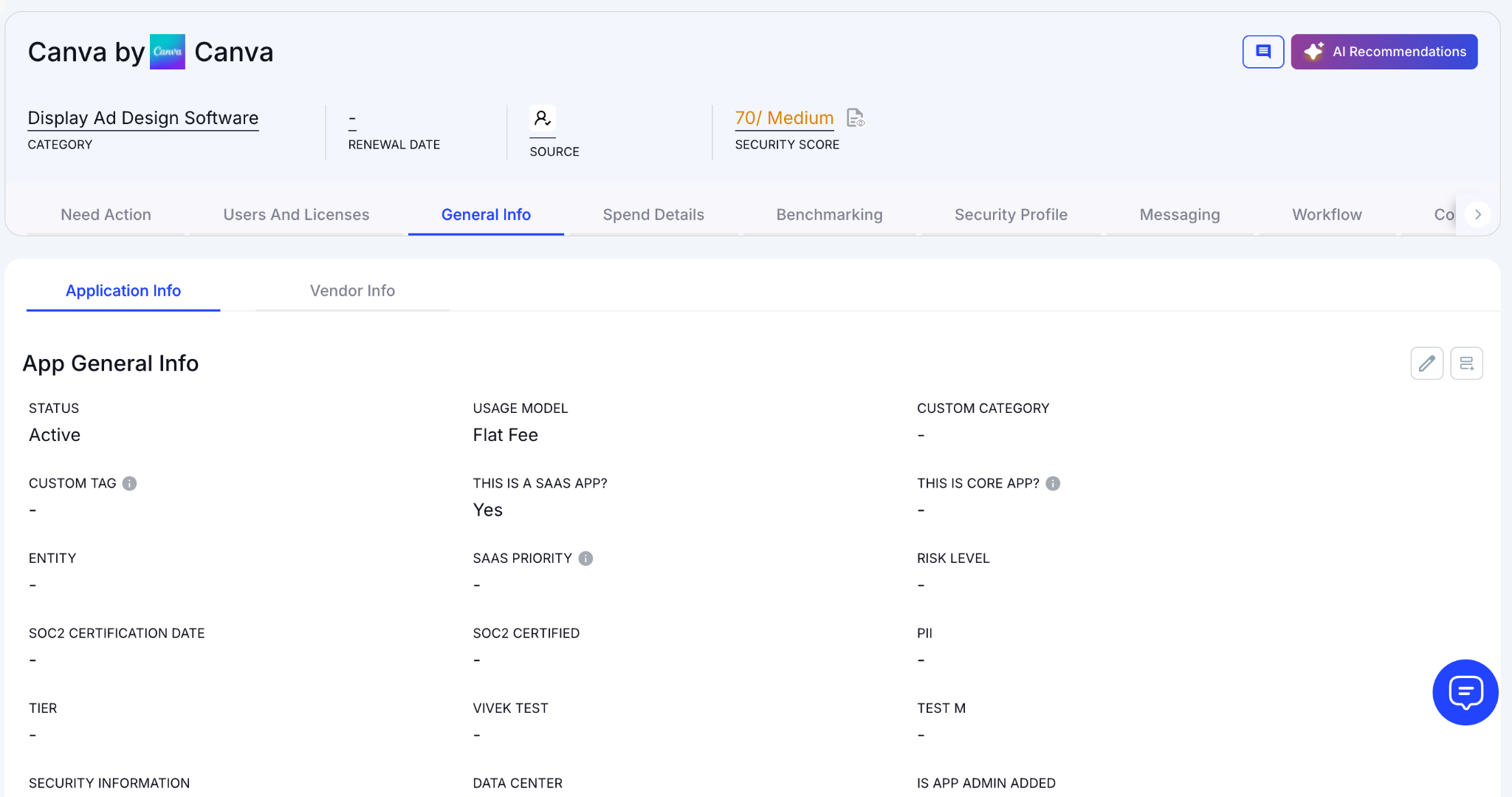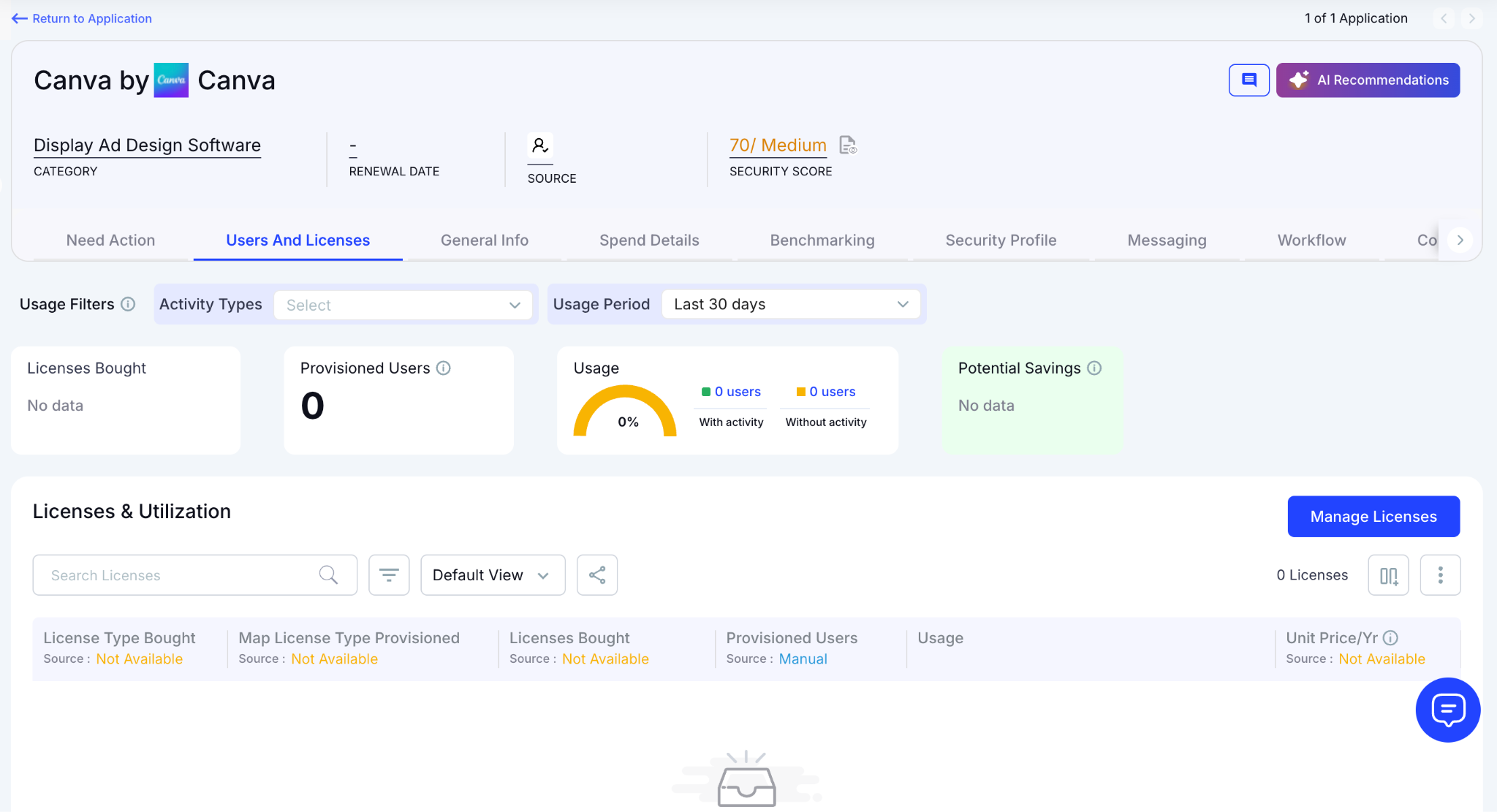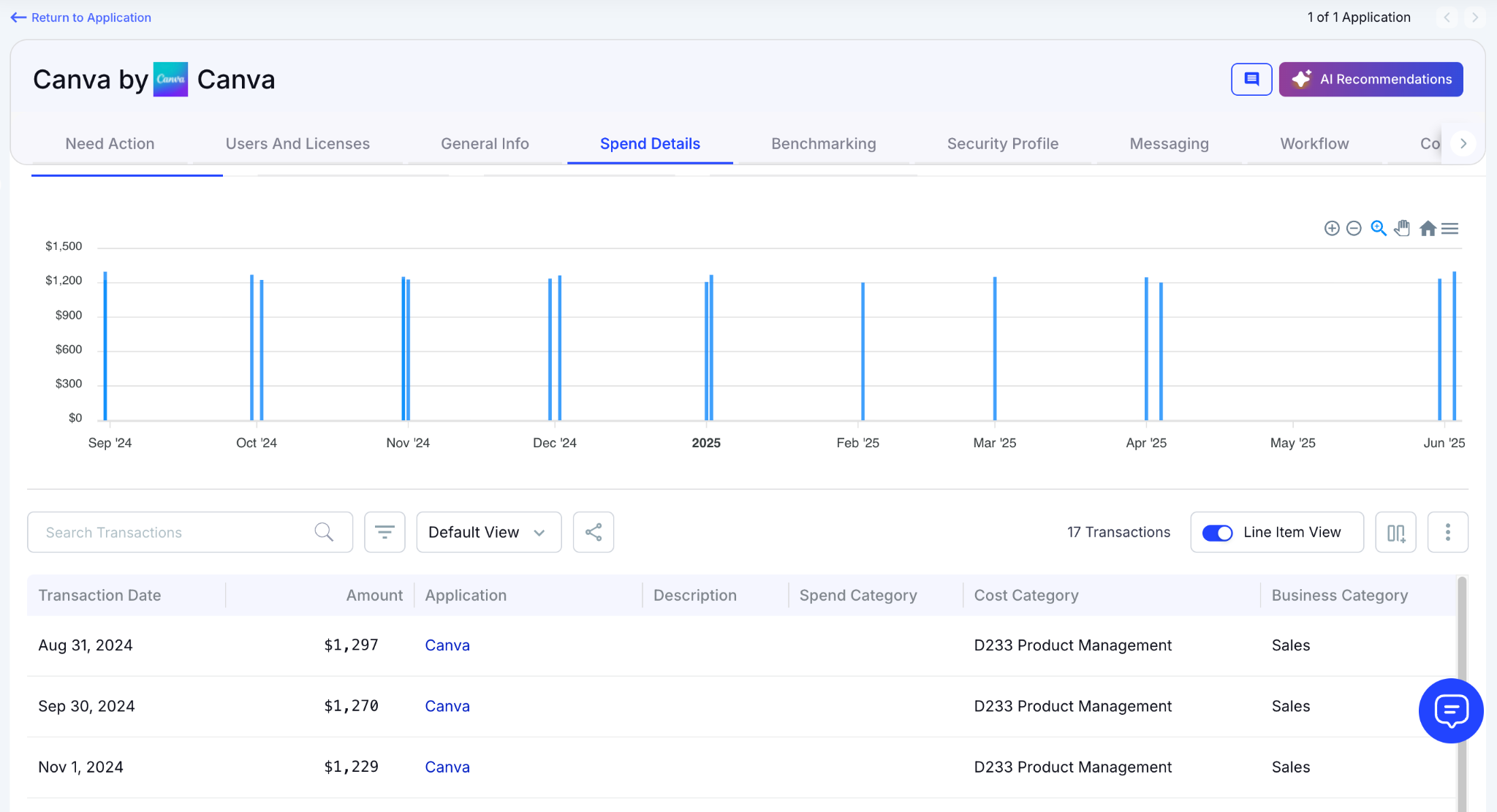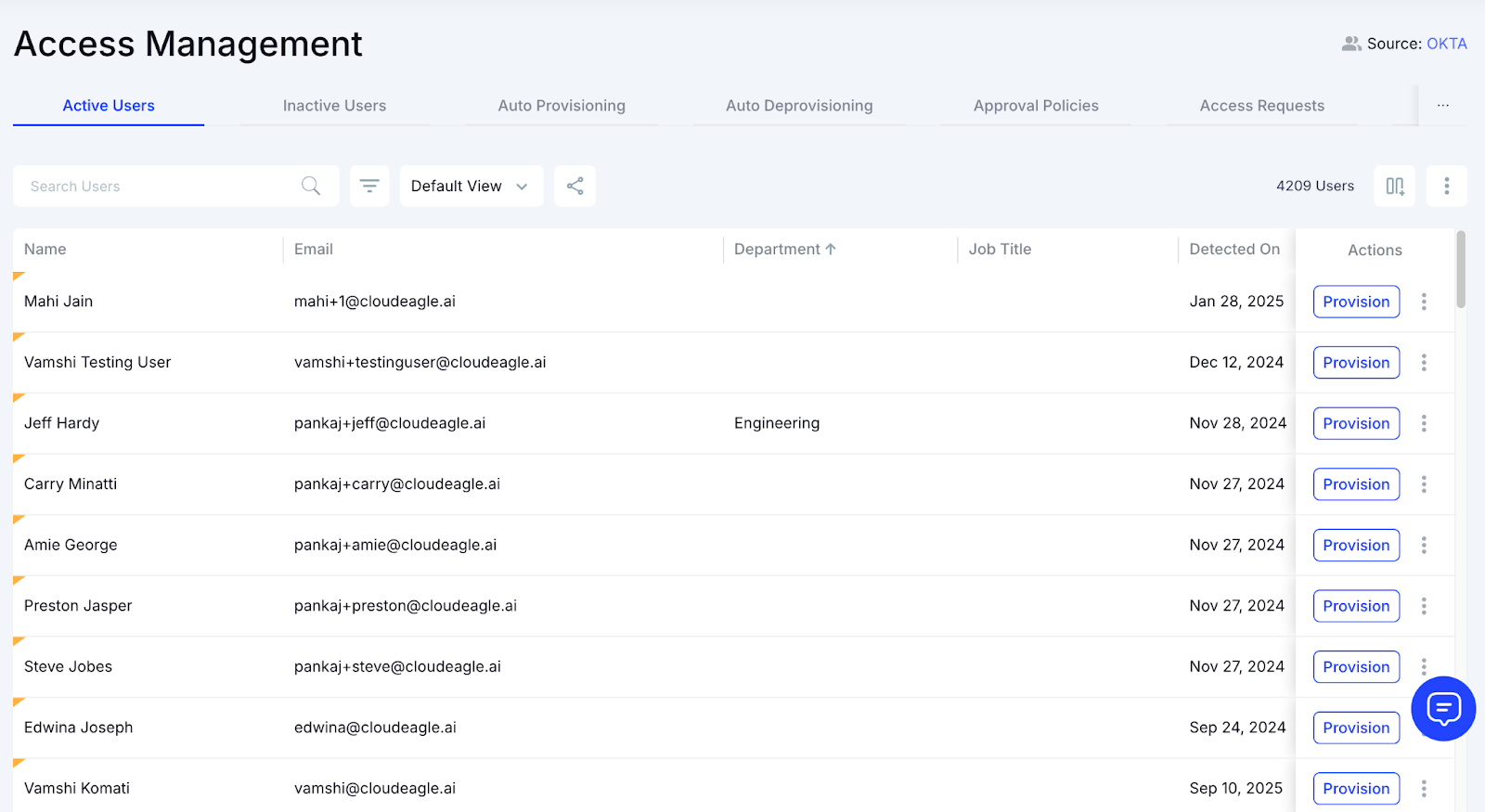HIPAA Compliance Checklist for 2025

You log into Canva, ready to design, but somewhere between templates, brand kits, and shared folders, costs start quietly stacking up. Seats multiply, add-ons creep in, and suddenly what looks like a simple subscription feels more like a budget puzzle.
Most teams don’t realize that over 35% of SaaS licenses go unused in mid-to-large enterprises, and Canva is no exception. Hidden seats, forgotten premium templates, and unmonitored shared access quietly drain resources.
CloudEagle.ai cuts through the clutter. By tracking usage patterns, identifying inactive accounts, and highlighting redundant SaaS applications, it ensures every Canva license actually earns its keep.
TL;DR
- Canva licenses and add-ons quietly inflate costs, with seats, brand kits, and premium templates often going unused across teams.
- Auto-renewals and scattered subscriptions create hidden spend, leaving finance and procurement struggling to reconcile invoices accurately.
- Inactive users and hoarded licenses silently drain budgets, while shared accounts and cross-department usage complicate visibility and control.
- Manual tracking is slow and error-prone, making it hard to spot duplicates, shadow IT, or unused features before costs accumulate.
- CloudEagle.ai centralizes license management, automates reclamation, tracks usage, and benchmarks pricing, ensuring every Canva seat is efficiently used and renewals stay optimized.
When Creative Freedom Turns Into Subscription Chaos
Canva feels effortless, drag, drop, click, and your team looks like design pros. But subscription complexity lurks. Licenses, add-ons, premium templates, and brand kits quietly pile up, and suddenly your invoice looks huge.
The Per-Seat Puzzle
Each user needs a license, but are they actually designing? Inactive seats sneak onto invoices, quietly racking up costs while finance assumes everyone is actively creating.
Hidden Premium Features
Brand kits, extra templates, premium fonts, they look harmless, but when spread across dozens of users and teams, these small add-ons quietly inflate your bill.
Team and Workspace Chaos
Departments grab separate subscriptions or share logins, creating overlap, confusion, and invisible costs. What starts as creative freedom often ends in SaaS sprawl, leaving collaboration tangled and budgets bleeding quietly.
Canva’s simplicity is powerful, but without a clear view of licenses and usage, that power can quickly become a hidden expense trap.
The Silent Spend Behind All That Creativity
You watch your team designing away in Canva, confident everything’s under control. But behind the sleek templates and brand kits, small charges accumulate. Spotting these sneaky costs early is the difference between controlled growth and a surprise invoice.
1. Auto-Renewals That Escape Review
Ever get that creeping feeling when an invoice lands and you don’t remember approving a single thing? That’s the magic of Canva auto-renewals. Left unchecked, they silently inflate your SaaS subscription management month after month.
A 2024 Blissfully report found that over 40% of SaaS renewals go unnoticed, costing enterprises millions annually. Canva licenses aren’t immune.
How Auto-Renewals Cause Trouble
- Invisible Triggers: Licenses renew automatically unless manually canceled, no alert, no fuss.
- Overlapping Plans: Teams often duplicate subscriptions thinking they’re filling gaps, unaware auto-renewals already covered them.
- Billing Confusion: Finance sees charges that don’t match actual usage, creating reconciliation headaches.
Even a small number of unnoticed auto-renewals quietly adds up, turning a simple design tool into an unexpected expense machine.
2. Procurement Left in the Dark
Procurement teams open their inbox, expecting clarity. Instead, they find a Canva invoice that feels like it was written in invisible ink. Licenses have shifted, add-ons slipped in, and approvals? Well, let’s just say no one kept track.
The Hidden Scenes Behind the Numbers
- The Phantom Font: That premium font everyone suddenly loves? Purchased by Marketing on a whim. Finance notices it a month later.
- The Duplicate License Tango: Design added extra seats because “we might need them”, but Ops already did the same. Chaos dances in perfect sync.
- The Time Warp Reports: By the time procurement gets the usage data, teams have moved on, projects are finished, and the numbers barely match reality.
Amid all this, decisions are made on guesswork, budgets are reconciled with shadow IT, and even seasoned teams feel like they’re chasing invisible costs. One day, a team asks, “Did we really need all these licenses?”, and nobody has the answer.
3. Teams Hoarding Unused Licenses
It starts innocently enough: a designer gets a license “just in case,” a marketer does the same, and another seat is added for a temp. Days turn into weeks, weeks into months, and suddenly the organization is quietly funding a small army of inactive Canva accounts.
- The Lonely Designer: Jamie hasn’t touched Canva in two months, but their seat still counts on the invoice. Finance wonders why costs climbed again.
- The Invisible Temp: A contractor had access for a single project. That project ended weeks ago, but the license lives on, collecting digital dust.
- The “Just in Case” Hoarders: Teams buy extra seats thinking future projects might need them. The future comes slowly, while the bill grows steadily.
Every hoarded license is like someone, somewhere thought it was necessary, and nobody questioned it. By the time anyone notices, the budget has quietly leaked, and reconciling reality with what’s being paid feels like untangling a web of invisible threads.
Why Managing Canva Feels Harder Than Designing in It
Opening Canva feels effortless. Managing its licenses? That’s another story. Suddenly, what should be a simple subscription turns into a puzzle of seats.
Teams spend more time tracking who has access and hunting down unused licenses than actually creating. It’s like trying to choreograph a performance while also building the stage from scratch.
1. License Data Scattered Across Departments
In many organizations, Canva licenses are scattered across Marketing, Design, Ops, and even interns who got temporary access. Finance tries to reconcile invoices, but the story each department tells rarely matches reality.
- Marketing’s Side: “We thought we needed five extra brand kits,” says the team lead. A week later, three of those kits are barely used.
- Design’s Perspective: Designers grab premium templates spontaneously, assuming someone else is keeping track.
- Ops and Admins: Temporary projects come and go, leaving abandoned seats that quietly add to the invoice.
As procurement consultant Linda Martinez notes,
“When license data is scattered, no one truly knows what’s being paid for. It’s a silent bleed on budgets.”
The result is a patchwork of accounts, overlapping subscriptions, and a finance team constantly chasing shadows instead of seeing the full picture.
2. No Central View of Spending or Usage
Imagine trying to manage Canva licenses when no one has a single, unified view. Marketing sees one number, Design another, and Finance is stuck trying to reconcile both. The result? Overspending quietly grows, while teams remain blissfully unaware.
- Fragmented Dashboards: Each department tracks usage separately. No one can see the full picture until invoices are already processed.
- Hidden Premium Features: Teams may assume seats are standard, unaware that premium elements are inflating costs.
- Delayed Insights: By the time spending reports reach management, the data is already outdated, making corrective actions slow and reactive.
A 2023 Blissfully study found that 46% of organizations cannot accurately track SaaS usage across departments, translating into millions in wasted spend each year. Without a centralized view, even the smallest oversights can snowball into significant budget leaks.
3. Limited Access Controls for Shared Accounts
In many design teams, sharing Canva logins feels easy. But what starts as a small convenience soon becomes a visibility nightmare. No one knows who’s accessing what, or whether those “shared” seats are being used securely.
The problem intensifies as teams grow. Admins lose the ability to revoke access promptly, leading to ex-employees or contractors retaining entry to creative assets. Without granular access controls, organizations walk a thin line between collaboration and compliance risk.
CloudEagle.ai: The Right Tool for Your SaaS Stack
Managing Canva licenses across multiple SSO logs, usage reports, and invoices often turns chaotic. Spreadsheets may track only a few core applications, leaving many others completely unmonitored.
This fragmented method results in unnecessary spending, compliance risks, and missed opportunities for optimization.

CloudEagle.ai delivers a centralized, real-time overview of all Canva licensing and spending. It automates tracking, usage analytics, and renewals, transforming a fragmented, manual process into a structured, data-driven workflow.
1. Seamless Canva Admin Console Integration
Manually handling Canva licenses is slow, error-prone, and frustrating. Building spreadsheets can take weeks, and by the time they’re ready, data is often outdated, leaving IT teams with incomplete insights on subscriptions, usage, and Canva pricing plans.
Current Process
Organizations often depend on spreadsheets and disconnected systems to track renewals, license counts, and user activity. This approach fragments data, and updates frequently become outdated before review.
Pain Points
Manual entry and delayed updates lead to errors and blind spots in software spend visibility. IT and finance teams lack accurate, real-time insights.

How We Do It
CloudEagle.ai aggregates vendor spend, usage data, and AI metadata extraction from all connected systems in real time. Renewal dates, costs, and usage are displayed side by side for easy analysis.
Why We Are Better
Onboarding takes only a few days. With over 500 integrations and AI-driven metadata extraction, CloudEagle.ai centralizes all license data, ensuring it remains accurate, reliable, and up to date.
2. Real-Time Usage Analytics & Shadow IT Detection
Without centralized oversight, Canva license management and duplicate apps can spiral out of control. Shadow IT often goes unnoticed, making it difficult for IT teams to spot redundant applications.
Current Process
Teams sometimes purchase duplicate applications through credit cards or free trials, which quietly convert into paid subscriptions. Detecting these overlaps manually is challenging.
Pain Points
Shadow IT leads to untracked Canva pricing and potential security issues. Manually identifying duplicates is labor-intensive and often misses overlapping applications.

How We Do It
CloudEagle.ai uses AI to automatically detect duplicate and overlapping applications while tracking feature-level usage. Shadow apps are flagged instantly.
Why We Are Better
Our AI evaluates functionality, not just app names. IT teams can automatically email users, trigger workflows, or create ITSM tickets to reclaim licenses and reduce risks.
3. Centralized License Management
Managing Canva licenses across multiple teams can feel overwhelming. Many enterprises rely on spreadsheets to track top applications while manually consolidating SSO logs, usage, and contract data.
Current Process
Most organizations manage only core apps in spreadsheets, combining SSO logs, feature usage, and contracts manually, slowing updates and accuracy.
Pain Points
Unmonitored applications waste budgets, and license reassignment rarely happens. Renewal tracking is inconsistent, resulting in missed cost savings.

How We Do It
CloudEagle.ai centralizes license management on a single platform. Nightly syncs consolidate IDP, contract, and connector data, offering real-time visibility into usage.
Why We Are Better
Automatic updates correlate purchased licenses, users, and feature usage across all apps. Teams can filter by license type and make fast, data-backed decisions.
4. Automated License Harvesting
Unused Canva licenses silently inflate costs, yet IT teams often lack a systematic way to reclaim them. Manually tracking usage and sending weekly emails to hundreds of users is tedious, error-prone, and time-consuming.
Current Process
IT teams email inactive users manually and update spreadsheets, making the process slow, repetitive, and often skipped.
Pain Points
Inactive licenses remain active, draining budgets and increasing SaaS security risks. Manual reclamation does not scale efficiently.

How We Do It
CloudEagle.ai automates license harvesting. Weekly workflows detect inactivity, notify users, and reclaim or downgrade licenses based on usage.
Why We Are Better
Automations run daily or weekly via Okta or Microsoft AD. Licenses are reclaimed instantly, reducing waste, saving time, and maximizing utilization.
5. License Price Benchmarking
CloudEagle.ai’s benchmarking feature enables organizations to secure the best value during license renewals. By comparing contracts against industry standards, enterprises can negotiate competitive rates and avoid overpaying.
Current Process
Procurement teams rely on vendor quotes or outdated deals. Peer comparisons are limited and often fail to reflect real market prices.
Pain Points
Lack of accurate data hinders negotiations, leading to overpayment or unfavorable contract terms.
How We Do It
CloudEagle.ai provides real-time price benchmarks, historical trends, and Canva pricing guide to support informed, data-driven negotiation strategies.

Why We Are Better
Canva pricing is detailed by SKU, license tier, and quantity, alongside key negotiation levers, ensuring renewals reflect actual market value.
6. Proactive Renewal Management
CloudEagle.ai supports renewal management with automated workflows triggered by contract dates. From approvals to adjusting Canva licensing counts, it prevents accidental auto-renewals and streamlines the process.
Current Process
Renewals are tracked through spreadsheets and long email chains. Approvals are slow, and auto-renewals are often overlooked.

How We Do It
CloudEagle.ai generates a renewal calendar using AI-extracted metadata or integrates with CLMs like Ironclad, Canva, or Zip. Renewal workflows trigger 90 days before the notice period, assigning tasks to finance, legal, and business owners.
Why We Are Better
Teams receive alerts with usage insights, price benchmarks, and alternative options. Approvals are tracked automatically, preventing missed renewals and unnecessary spending.
7. Leverage Vendor Dashboards
CloudEagle.ai provides vendor dashboards for a complete view of Canva subscription data. Teams can track Canva licensing usage, renewal dates, and spending patterns to make data-driven decisions.

These dashboards highlight overspending and unused licenses, simplifying reclamation. They also reveal usage trends, helping organizations proactively adjust subscriptions and optimize Canva costs.
8. Simplified App Access Management
CloudEagle.ai streamlines Canva access by allowing employees to request licenses directly through the platform or Slack, eliminating long email chains and manual steps. Managers can review and approve requests in real time, ensuring prompt access.

This method guarantees employees receive correct licenses without delays and removes approval bottlenecks. Each request is logged for transparency and compliance, making access management efficient while reducing administrative workload.
Conclusion
For many teams, Canva’s brilliance hides a growing mess: scattered licenses, duplicate users, and silent renewals that drain budgets faster than anyone notices. What begins as “just one design seat” quietly scales into a tangle of shadow subscriptions.
But control doesn’t have to kill creativity. With CloudEagle.ai, finance and procurement teams can finally see every Canva license, every renewal, every cost, all in one place. No more chasing invoices or guessing who still uses what.
Because the best designs shouldn’t come with subscription surprises, they should come with confidence.

%201.svg)









.avif)




.avif)
.avif)




.png)









